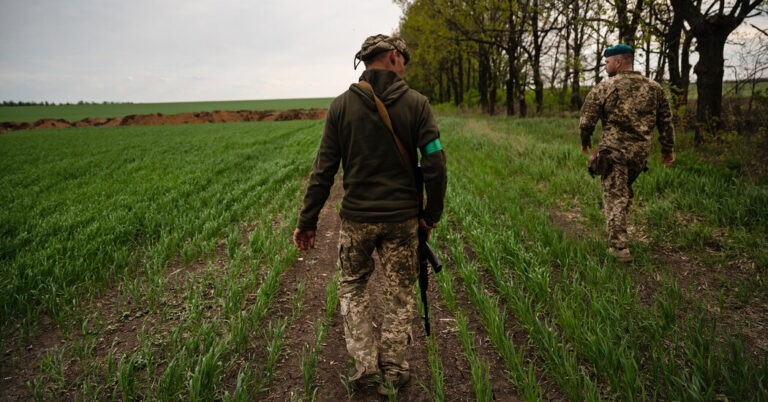President Volodymyr Zelensky of Ukraine said Sunday that criminal proceedings had been initiated over an episode in which Russian missiles struck a group of Ukrainian soldiers at an award ceremony in the south of the country, killing some and leaving others wounded.
Mr. Zelensky, who said the strike had taken place in the Zaporizhzhia region, gave no details about what had happened and did not cite a casualty toll, but Ukraine’s government rarely talks about setbacks in its war against Russia, and his acknowledgment suggested a military failure of unusual gravity.
“It is a tragedy that could have been avoided,” Mr. Zelensky said in a speech released on social media. “The main thing is to establish the complete truth about what happened and prevent such incidents from happening again.”
A military official, who declined to be named because he was not authorized to disclose information, said that two missiles struck in succession on Friday morning as soldiers from the 128th Mountain Assault Brigade gathered in the village of Zarichne, around 10 miles north of the front line in the Zaporizhzhia region. The soldiers were there to mark Artillery Day, one of a series of days in Ukraine to honor branches of the military.
The official said that any investigation would focus on how Russia had found out about the event, enabling it to target it. But the official said that by holding the ceremony in the open, senior brigade members appeared to have violated military dogma in a conflict in which both sides have struck at troop concentrations behind the front lines.
In a statement on Facebook late Saturday, Ukraine’s military said that Russia had launched “sneak attacks” on 26 settlements in Zaporizhzhia and targeted personnel of the 128th brigade with a missile, “resulting in the deaths of servicemen and various degrees of injuries to local residents.” It did not give further details.
Viktor Mykyta, the head of the military administration in Zakarpattia, a western region from which many members of the brigade came, confirmed the strike and deaths, and he announced three days of mourning in his region. “I recommend visiting the churches and praying for our defenders,” he said on the Telegram messaging app.
Russia’s Defense Ministry said on Sunday that its forces had been active in the Zaporizhzhia region but did not refer directly to a strike in Zarichne. It was not possible to confirm the number of casualties independently or the nature of the strike in Zaporizhzhia.
Both sides have suffered substantial casualties this year amid fierce fighting, though battle lines have remained largely static, and it did not appear that Friday’s strike was sufficiently bad to alter the trajectory of the war. But in his speech, Mr. Zelensky deviated from his usually optimistic tone and said that the episode had come at a difficult moment for Ukraine.
“When we go through weeks like this, filled with pain and difficult discussions, it is important for people to understand that what weighs on their hearts is seen, and the necessary changes will be made,” he said.
“This applies to many things, from negligence that can occur to the Soviet legacy and the terrible bureaucracy that prevents Ukraine and many in our defense forces from realizing their potential correctly and effectively,” he said.
He did not specify what broader problems the country faced, but after 20 months in the spotlight, Ukraine has slipped down the international news agenda in recent weeks. Some Republicans, including former President Donald J. Trump, have argued that the United States, Ukraine’s most important military backer, should cease providing aid.
On Thursday, the House passed a bill that would tie $14.3 billion in military aid for Israel to domestic spending cuts and provided no money for Ukraine. The bill has no chance of passing in the Senate, but it illustrates that U.S. aid for Ukraine is no longer a given.
Most importantly, a counteroffensive that Ukraine began in June, buoyed by billions of dollars in military funding and training by allies in NATO, has not achieved its objective of cutting through Russian defenses in Ukraine’s south and east. This and the increasing prospect of a prolonged conflict have, in turn, tested national morale.
The commander of Ukraine’s armed forces, Gen. Valery Zaluzhny, said that his troops were locked in a stalemate with Russia along the front line and there was no imminent prospect of a breakthrough. The comments, made in an interview published last week in the British magazine The Economist, were unusually candid.
Mr. Zelensky said in an interview Sunday with NBC News that he did not think there was a stalemate and reiterated a demand for more military aid, but the divergent remarks suggested a possible rift between Ukraine’s top civilian and military leadership.
Military experts say that it may be difficult for Ukraine to achieve a rapid advance in the coming weeks, given that it has not happened since June, and that any delay could enable Moscow to ramp up its artillery production, plant more land mines and improve its defensive structures.

